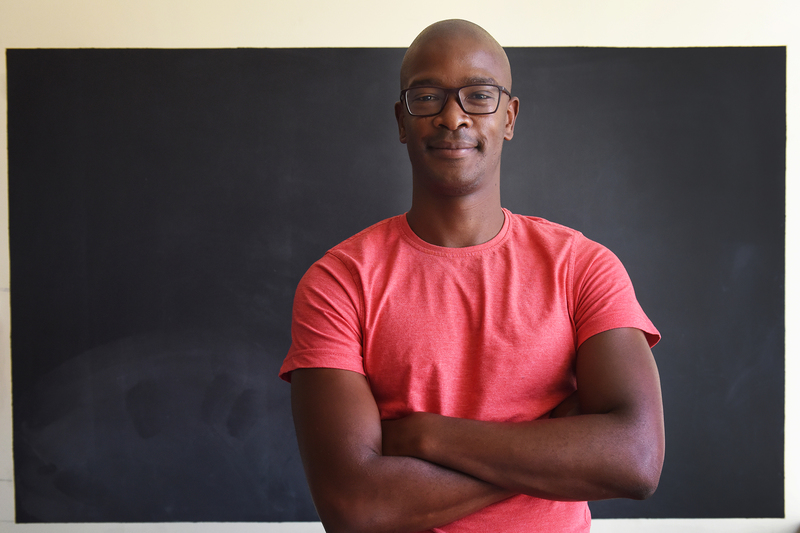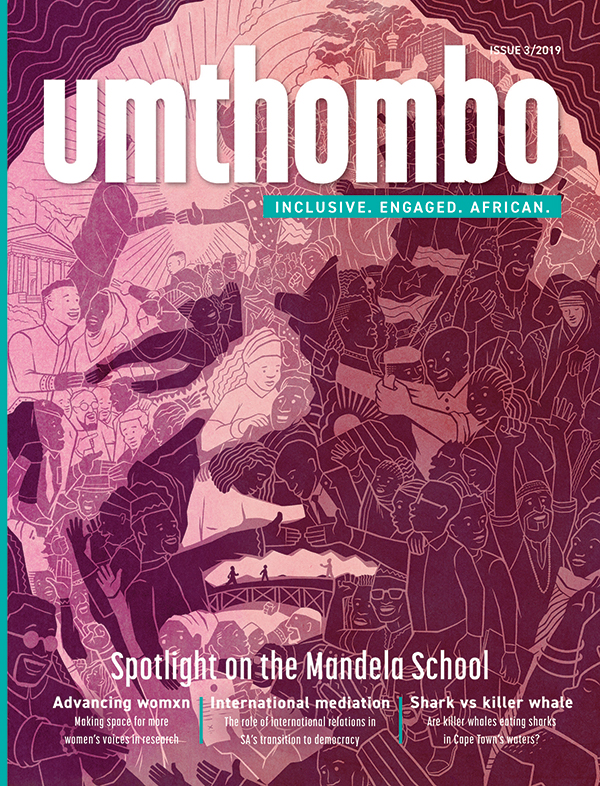SA’s transition to democracy: miracle or mediation?
09 July 2019 | Story Ambre Nicolson. Photo Michael Hammond. Read time 8 min.
In his new book, International Mediation in the South African Transition, Dr Zwelethu Jolobe argues that the role of international mediation in South Africa’s transition to democracy has been downplayed and undervalued.
“There is a strong thread of exceptionalism that runs through the narrative of South Africa’s transition to democracy,” says Jolobe. “It is often described as a homegrown miracle, but in fact, the international community – particularly the Commonwealth and the United Nations – played a profound and beneficial role in the political transition to end apartheid.”
Jolobe, a senior lecturer in political science at the University of Cape Town (UCT), first became interested in the subject during his PhD research. “At the time, I was l looking at the pre-negotiation that occurred in the period before the end of apartheid, and I realised there was a pattern of downplaying the role of international, third-party mediation.”
A prophetic architecture
In his book, published by Routledge, Jolobe compares mediation attempts by the Commonwealth and United Nations.
“There is a strong thread of exceptionalism that runs through the narrative of South Africa’s transition to democracy.”
“Between 1945 and 1962, many former British colonies and Commonwealth members became independent states, including Pakistan, India, Nigeria and Kenya,” explains Jolobe.
“There was thus a huge amount of pressure for Rhodesia and South Africa to reform. When South Africa re-applied to join the Commonwealth after becoming a republic in 1962, Commonwealth members agreed on condition that apartheid was dismantled. Of course, the South African nationalist state refused.”
According to Jolobe, from this time onwards, the Commonwealth – including many newly independent states – supported the anti-apartheid movement. In 1985, the Commonwealth formed the first Eminent Persons Group to investigate and encourage negotiations towards ending apartheid.
“Most people think of the Commonwealth’s attempts to end apartheid at this time as a failure since PW Botha – the president then – and the African National Congress (ANC; South Africa’s current governing political party) rejected the Commonwealth proposal. In fact, if you look at the formula the Commonwealth mediators presented, it contains all the elements that would later form the basis of negotiation during the secret talks that happened in the United Kingdom in 1987,” says Jolobe.
“If you look at the most important point of agreement between the two sides that led to the unbanning of the ANC in 1990, many of them can be seen first in the Commonwealth’s earlier attempts at negotiation. In that sense, the Commonwealth’s effort at mediation was prophetic.”
Breaking a deadlock
The United Nations’ (UN) role in mediation came later. “The UN declared apartheid a crime against humanity in 1973,” explains Jolobe. “So, by the early ’90s, relations between the United Nations and South Africa had been adversarial for a long time.”
“South Africa is not exceptional. In fact, it is dangerous to explain our history as miraculous. Our transition to democracy was due to the hard work and commitment of many local and international figures.”
In 1992, the historic record of understanding pushed the ANC and nationalist governments towards a settlement. At the same time, an escalation in violence made many South Africans believe that civil war was imminent.
“At this point, negotiations broke down, and it took Western powers to come together and say, ‘We have gone too far down the line, let’s find a way around this’,” explains Jolobe.
“It was the Spanish Prime Minister who came to South Africa at the time. Later the British Prime Minister involved the Americans. They lobbied the then UN Secretary General to arrange a meeting in Lagos attended by leaders of both sides. From there, the UN Security Council held an extraordinary meeting attended by a huge array of people, from religious figures to academics to politicians and leaders of anti-apartheid organisations.”
This led to the creation of the United Nations Observer Mission to South Africa. “It’s clear that without this mediation there was a very real risk of negotiations breaking down entirely,” says Jolobe.
An appetite for peace
“Often people measure the success of mediation only in terms of a conflict ending or parties getting back to the negotiating table,” says Jolobe. “But if we examine the attempts of the Commonwealth and United Nations in South Africa, we will invariably shift how we measure successful mediation.”
In Jolobe’s opinion, there is a lot of value in third-party intervention, not only in resolving conflict but also, more generally, as a way to create equity in a world that lacks a central authority.
“Often people measure the success of mediation only in terms of a conflict ending or parties getting back to the negotiating table. But if we examine the attempts of the Commonwealth and United Nations in South Africa, we will invariably shift how we measure successful mediation.”
“Wars happen because people can’t see solutions from within the conflict. Outside mediators play an important role in these situations as can be seen from the role of the Commonwealth and United Nations in South Africa’s transition. Their attempts were not constant and not always successful in the short term, yet they played an essential role in agenda-setting and keeping negotiations from breaking down.
“South Africa is not exceptional. In fact, it is dangerous to explain our history as miraculous. Our transition to democracy was due to the hard work and commitment of many local and international figures.
“This is important because it underscores the role of international mediation. If such efforts are valued and understood to be replicable there is a greater chance of peacefully resolving current and future conflicts around the world.”
 This story was published in the third issue of Umthombo, a magazine featuring research stories from across the University of Cape Town.
This story was published in the third issue of Umthombo, a magazine featuring research stories from across the University of Cape Town. Umthombo is the isiXhosa word for a natural spring of water or fountain. The most notable features of a fountain are its natural occurrence and limitlessness. Umthombo as a name positions the University of Cape Town, and this publication in particular, as a non-depletable well of knowledge.
Read the complete third issue online or subscribe and receive new issues in your inbox every few months.
 This work is licensed under a Creative Commons Attribution-NoDerivatives 4.0 International License.
This work is licensed under a Creative Commons Attribution-NoDerivatives 4.0 International License.
Please view the republishing articles page for more information.
Research & innovation





































